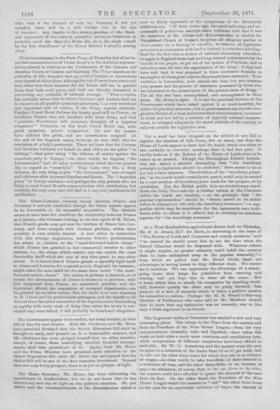There isa summary in the Paris Temps of Thursday last
of an im- portant communication of Count Benses to the Austrian represen- tatives abroad in relation to the Conferences of the German and Austrian Courts at Gastoin and Salzburg. The Temps asserts on the authority of this despatch that no political treaties or conventions were signed at either place, although the two Powers have convinced each other that their interests for the future will run in parallel lines, that both need peace, and both are directly interested in preventing any outbreak of national revenge. " Thus a resolve has naturally arisen that in future Germany and Austria shall act in concert on all possible questions and events,"—a very trenchant and important sort of resolve, if the Temps reports correctly. Further, Count Beust declares his hearty good-will to France, on condition France does not interfere with these views, and that " patriotic Frenchmen will renounce thoughts of a hopeless vengeance." Certainly, on this head, Count Beust can, with great propriety, preach resignation. He and his master have suffered like griefs, and are nevertheless resigned. At the end of the despatch comes, however, its true drift, like the revelation of a lady's postscript. There we learn that the German and Austrian Cabinets are bound to each other on one point " in writing,"—that point being " the defence of society against the anarchist party in Europe,"—in other words, we suppose, " the International " and all other combinations which the two powers like to regard as " anarchist." That looks very like a Holy Alliance, the very thing to give " the International " new strength and influence after its recent blunders and fiascos. The " Anarchist party " in Europe contains—not perhaps the only persons who are likely to read Count 13oust's communication with satisfaction, but certainly the only ones who will find in it any real justification for satisfaction.






























 Previous page
Previous page